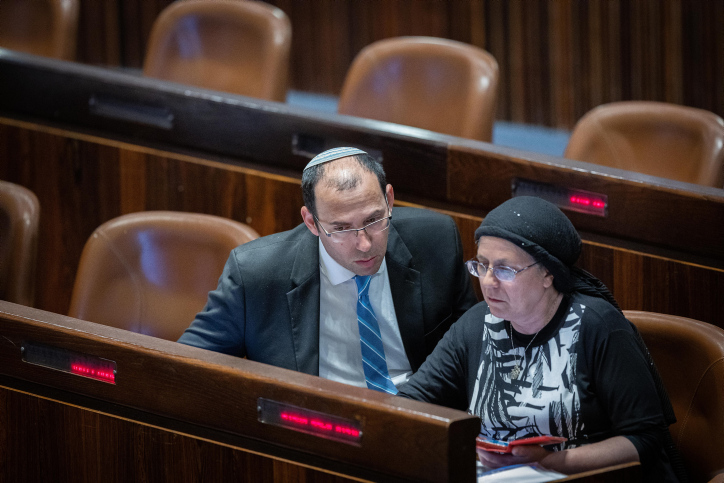Likud leader Benjamin Netanyahu will attempt to swear in his governing coalition of far-right and ultra-Orthodox parties on Thursday, Knesset Speaker Yariv Levin said Monday, with the former premier looking to retake power before a deadline to get his unruly partners in line.
Levin formally informed the Knesset plenum on Monday of Netanyahu’s announcement last week that he could form Israel’s next government, starting a seven-day clock for the coalition of three far-right parties and two ultra-Orthodox parties, in addition to his right-wing Likud to be officialy sworn in.
Levin said that a hearing and confidence vote on the incoming government is slated for Thursday morning, though it can be delayed until the morning of January 2.
Netanyahu still has to overcome some key stumbling blocks before swearing in the government, including formalizing coalition agreements with almost all of his partners, dividing jobs among his Likud party members, and finalizing two key pieces of legislation demanded by coalition partners as preconditions.
The first of these bills — to enable appointing an independent settler minister within the Defense Ministry, as well as clear a path for Shas’s Aryeh Deri to run two ministries, despite a recent suspended sentence for tax fraud — is expected to come for its final votes on Monday evening.
A second bill to expand political authority over the police leadership and policy demanded by far-right incoming police minister Itamar Ben Gvir was slated for final votes on Tuesday, after it cleared a committee where it was held up by opposition lawmakers and legal advisers who warned against rushing through the controversial moves.
A bill must pass three readings in the Knesset to become law.
Likud leader Benjamin Netanyahu speaks at the funeral of Rabbi Chaim Druckman on December 26, 2022 in Masu’ot Itzhak. (Yonatan Sindel/Flash90)
Even if he clears the legislative hurdles, Netanyahu still has yet to finalize coalition agreements with his coalition partners and to divvy out roles to his own party before the swearing-in.
He has only signed a coalition agreement with United Torah Judaism, and even that agreement will be slightly amended to pull a clause giving the ultra-Orthodox party a seat on the security cabinet. While UTJ is currently led by its Agudat Yisrael faction, whose leader signed the agreement, its Degel HaTorah faction did not coordinate its finalization and threatened to reopen negotiations over the security cabinet role Agudat Yisrael’s leader.
Likud has drafted framework agreements with the far-right Religious Zionism and Otzma Yehudit, but has yet to finalize and sign those deals. Otzma Yehudit leader Itamar Ben Gvir hinted that talks over their deal may not be final, after he criticized Netanyahu for seemingly amending the terms of their agreement regarding the removal of legislation barring racist politicians from the Knesset.
The Haredi Shas and far-right Noam also have yet to seal deals with Likud, although all partner parties have agreed to the roles parceled out among them.

Otzma Yehudit party leader Itamar Ben Gvir at the Knesset in Jerusalem, December 26, 2022. (Olivier Fitoussi/ Flash90)
While government positions have been put in order for Netanyahu’s coalition partners, confusion still persists within Likud. Some of its members, including David Bitan, have publicly complained that Netanyahu has handed out too many key positions outside of the party, given that it is the Knesset’s largest.
Netanyahu has yet to inform most Likud members of their roles in the next Knesset, and has not yet given a final word on who will succeed Levin this week as Knesset speaker. Levin signaled his intention to resign on Tuesday, in line with a plan that his posting would only be temporary to shepherd the coalition through its legislative blitz ahead of the swearing-in process.
Levin, a close Netanyahu confidant and rising star in the party, is expected to serve as justice minister or foreign minister.
The incoming government has been harshly criticized by its political opponents for its plans to rein in the judiciary, roll back civil rights protections, realign some security command structures and boost funding and protections for religious schools, among other issues.
Scheduled to be relegated to the opposition benches within the week, Prime Minister Yair Lapid said that policies being pushed by members of Netanyahu’s incoming government constitute a “looting of democratic value and will infringe upon minority rights.”

Outgoing Prime Minister Yair Lapid leads a Yesh Atid party meeting in Jerusalem, December 26, 2022. (Olivier Fitoussi/Flash90)
“I ask myself who was most fearful to live in this country,” he said at the start of his Yesh Atid party’s faction meeting in the Knesset on Monday.
“LGBT people who heard from Simcha Rothman that they will be barred from hotels? Arabs who heard from Orit Strock that doctors can refuse to treat them? Activists in women’s organizations who discovered they are on Avi Maoz’s blacklists? Reform and Conservative Jews who heard from [MK Meir] Porush that they will be barred from the Western Wall? Or senior members of the state prosecution and the police who heard from Yair Netanyahu that they should be prosecuted for treason, for which the penalty is death?” Lapid said.
Lapid was referring in part to a coalition demand touted Sunday by Religious Zionism MKs that would allow business owners and even doctors to refuse service if it interferes with their religious sensibilities — something Netanyahu twice clarified that he does not support.
“This is no longer a political struggle,” Lapid continued. “It is a battle for the soul of the State of Israel as a Jewish state, as a democratic state, as a sane state.”
Responding to the criticism, Netanyahu accused Lapid of not respecting the results of the November 1 election.

Religious Zionism MKs Simcha Rothman and Orit Strock in the Knesset in Jerusalem on May 9, 2022. (Yonatan Sindel/Flash90)
“Lapid, losing the election is not the end of democracy, it is the essence of democracy. You refuse to accept the people’s decision,” Netanyahu said in a video message recorded after Lapid’s remarks.
“You are inciting the public against the people’s decision, you spread endless lies against the elected government. What will be your next step? Send your protesters to climb the Knesset fences?” Netanyahu said.
Netanyahu called on Lapid “to behave responsibly, to accept the people’s decision, and to transfer power in an orderly manner so that we can fix everything you have destroyed in the last year and a half.”
Lapid has said that he accepts the election results, but has been unyielding in his criticism of the incoming government’s policies towards religion and its role in the state, judicial reform, and minority rights.
“If anyone thinks that this will stop with the formation of the government, they are completely mistaken,” Lapid said, calling Netanyahu “the weakest prime minister ever.”
“If we don’t stop them, it will get much worse,” he added.
Netanyahu has been accused of giving in to far-reaching demands that will fundamentally alter Israel’s democratic system in order to win support from the only allies he has left, with other potential partners refusing to back a government led by a politician on trial for corruption.
Among those changes is planned legislation that would allow the Knesset to override a High Court ruling deeming a law unconstitutional, which would give Haredi and right-wing parties wide leeway to pass measures described as discriminatory, such as draft exemptions or protections for those who refuse service to members of the LGBT community.

Defense Minister Benny Gantz speaks during a faction meeting of the National Unity Party in Jerusalem, December 26, 2022. (Olivier Fitoussi/Flash90)
Speaking at a faction meeting of his Blue and White faction in the Knesset on Monday, outgoing Defense Minister Benny Gantz issued a public call to ultra-Orthodox political parties to oppose elements of religious coercion and discrimination that are being hotly debated in coalition agreements.
“What you’re doing and supporting these days is to turn Israel from a Jewish state into a religious state,” Gantz said. “From a Jewish state to a tribal state — and the result will harm Judaism, harm religion and harm the State of Israel as a whole.”
Gantz said that legislation allowing for discrimination and racism “will hurt you first of all… and will push you further away from the general population.”
He added that such moves could lead to “hotels only for secular people, workplaces announcing they won’t accept Haredim,” he said.
When that happens, Gantz said, “remember that you were part of the constellation that whitewashed harm to minorities. That disintegrated us into tribes.”
The leaders of most parties that will form the next opposition met in the Knesset and issued a joint statement vowing to oppose the incoming government.
“We will work together to fight this backward, anti-democratic government that is being established, which will dismantle Israel from within,” said Lapid, Gantz, Labor’s Merav Michaeli, Yisrael Beytenu head Avigdor Liberman and Mansour Abbas of Ra’am.
“When we return to power, we promise to cancel any extremist legislation that harms democracy, security, the economy or Israeli society,” they added.
A representative of Hadash-Ta’al — which will also be in the opposition but does not generally cooperate with the other parties — was not present.